#positionality statement
Explore tagged Tumblr posts
Text
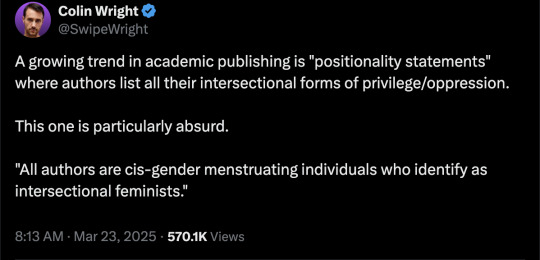

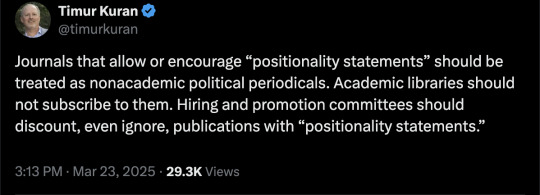
==
Literally a manifestation of the Genetic Fallacy.


"Positionality Statements," like pronouns-in-bio, are not completely useless. They're red flags offered up willingly that tell you someone is not to be trusted or should be ignored.
🚩🚩🚩
#Colin Wright#Timur Kuran#Genetic Fallacy#positionality statement#positionality#intersectionality#intersectional feminism#feminism#pronouns in bio#red flags#religion is a mental illness
26 notes
·
View notes
Text
thinking abt like. there's so much fiction out there that makes me feel bad! sometimes really deeply bad! and like, in many many cases i could present a whole argument abt how it makes me feel bad bc it's pressing on bruises inflicted by some systemic prejudice that has deeply wounded my psyche—and that argument would be true!—and still i don't want that fiction erased from existence, or modified to suit my taste, or anything else that enacts my will on it, rather than the artist's and the artist's alone; i don't even want the artist erasing it because my argument ultimately convinces them it's Bad! produce a revised edition of it, fine; stick an asterisk or other warning on it, fine; but i still want the original to be available somewhere, because i don't want to be responsible for blotting creation out of existence. even when it's a creation i hate, i don't think that should be my place (or indeed anyone's).
mind you, i absolutely do want to feel that i've got somewhere i can analyze/vent about fiction like that, and people who will take my analysis/venting both seriously and sympathetically;
and i want fiction to exist that doesn't make me feel bad;
and i definitely shouldn't have to put up with discussions around fiction in which fellow discussants further express a prejudice towards me, or justify it, or whatever;
but it just seems so obvious to me that a world where framing yr discomfort with a work of fiction in sufficiently sympathetic (victimized) terms leads to its deletion [not that i think this is what all leftists who complain abt offensive fiction are looking to have happen! but i do get the impression that at least some of them might be?] is a frightening world—
a world where, to choose a sufficiently sympathetic (victimized) example, authors who have themselves been harmed by prejudice become unable to explore the workings of that prejudice in their fiction, unless they're doing it in a way that's unambiguously, didactically condemnatory—isabel fall is the obvious example here, but i'm thinking also of all the women and transmasc authors who write fic that, quite frankly, eroticizes misogyny and abuse of power, and how sometimes i think stories like that are hot and sometimes i don't feel particularly strongly about them one way or the other and sometimes they leave me furious or fucked up or both! but like. even when i hate it, even when it offends me not as a matter of abstract principle or allyship but right in my own personal gut—i still do feel that people have to be allowed to write, and to publish, fiction that strikes me personally as being in bad taste!
because the minute you let anyone's taste dictate what's allowable to express, even if it's leftist taste, you're going down a bad road; it's like saying monarchy can be a good system as long as the monarch is a good person. no! because (a) no system that relies on good actors to be good is a good system; and also because (b) no one who's happy to have power over others is actually a good person! [that's an awfully strong statement and i'm open to the idea that it may have some asterisks, but like. as a general rule: cincinnatus or bust.]
and similarly i feel like. if you personally want not just to critique other people's fiction—valid and good and i do it all the time—but to crush it out of existence because it expresses an ideology you may not (i may not!) like? i don't trust you. i think you're trying to substitute pain for principles, and like. i have huge sympathy for pain! i live with a lot of my own! but pain doesn't actually, in itself, necessarily constitute good moral guidance—it can lead you towards valuable sensitivity that helps people we should care about, but it can also lead you towards impatient reactivity that harms people we should care about; and ultimately it's thinking abt our pain, imo, not the pain itself, that steers us towards the former outcome and away from the latter.
#this is SO fucking long and still not really a coherent position statement lmao#if only i'd written essays in the tumblr post editor‚ back when i had them to write#i never would've struggled to meet the required word count#but like. lotta issues tangled up here and i just think it's like. SO easy to be steered one way by yr gut on this stuff#and then think abt it for a bit and realize yr gut has left zero room for a lot of positionalities you actually find sympathetic#while providing potential fodder for stances you fucking hate#(like—frankly i'm astonished no fundie students have started arguing universities should provide content warnings for queer content)#(i obviously am not opposed to content warnings and use them on this blog all the time but. tools can be picked up by anyone)#and like. it's really easy‚ i think‚ to say that and have it come across as not caring abt other ppl's genuine pain#but like. i care a lot abt ppl's pain! i just think pain is not‚ in itself‚ necessarily a great basis for policy#anyway. Just Some Nightblogging; happy 2 entertain non-ad-hominem discussion but also this isn't‚ like‚ a polished position paper
9 notes
·
View notes
Text
No but, when people say “trans men really are the men of trans people” they think they’re saying something about trans men, when they’re really saying something about their own ties to gender essentialism and adjacent-ness to radfem gender critical arguments.
Because we all know you’re not just saying “trans men are men” with that statement, but that trans men are bad because they are men and this is because men are ontologically bad, that man is not a neutral gender that would be able to exist if we eliminated the patriarchy because man is a gender that only exists as a positionality in patriarchy above women. And if that’s how the gender of man is built that means the gender of woman is also constructed from this framework, meaning that the gender of woman is nothing more than a positionality within patriarchy below man, and so gender is meaningless.
Which is honestly why I think we’re seeing so much “AFABs can’t be transfem” because gender is meaningless to an extent, but we still need to create these separations, then we obviously should be doing that separation along the lines of sex.
It all just rolls back around into bioessentialism, in the end, even if that bioessentialism looks different from the bioessentialism born in cis circles. And the idea that there needs to be some binary, either based on gender, or sex, or both, that we sort people into. And so really, gender and bioessentialism just feed into intersexism.
666 notes
·
View notes
Note
there is btw, A LOT to be said abt how theres only one big leftist video essayist who is transmasc or adjacent. like the transmasc erasure in the leftist youtube space is RAMPANT
Oh GOD yeah.
And necessary statement of "transfems are marginalized and their inclusion is equally vital to transmascs and unaligned people, and they also experience a ton of exclusion and abuse in leftist creative spaces."
That being said, I feel like so often people just don't even recognize the absence of transmascs because of the masculinity/manhood. Like there are people who care about diversity and inclusion will make sure they talk about transfem history, promote transfem creators, and I don't think its out of malice, or even done consciously, but they think that transmascs don't need that same care because well. They're men, right?
& that's half of transmasc erasure. One half is erasing the manhood/masculinity (misgendering), but the other half is erasing the transness and acting like transmascs have the exact same positionality as cis men, and transmascs are essentially exchangeable with cis men. Our unique needs are not considered. When your feminism is fundamentally cissexist, you view it as "trans women are women and its important to support women creators." And again, I don't think this is always done consciously, but on some level people think "trans men are men, and men don't need to be promoted as much." Its ciswashing transmasculinity so that ATM isn't exposed and talked about in leftist spaces.
Its fucking wild when you start seeing transmasc absence as the presence of erasure, and you watch all these otherwise accepting people who put effort into promoting marginalized voices, to whom the absence of transmascs in their spaces and work is completely invisible. And when you point it out, people will come up with arguments like "I guess transmascs don't care that much about [x]?" instead of imagining that it might be because of systemic anti-transmasculinity. The reasoning for a lot of people is always that it must somehow be transmascs' fault that they aren't represented.
2K notes
·
View notes
Note
There's a whole genre of post I keep seeing that takes the (completely fair and accurate) statements of "trans women are women and that should not be couched in terms like 'identifies as'" and "trans women experience misogyny" and mashes them together to take this stance that experiencing misogyny is what makes trans women's gender legitimate, since it reflects Tangible Circumstances under the patriarchy and that's a waaaay more legit and real and good way to assign gender labels than what they "identify as". And every time it's mind-boggling to see so many people spreading that around totally unquestioned since apparently no one's bothered to think what the implications of that framework are for any other trans person. Like I guess I already knew a lot of people think about nonbinary people and trans men like they all get a magical "anti-misogyny" talisman to carry around, but it's usually not quite that blatant...
YES. THAT'S EXACTLY IT. Some trans women and trans men decided that it would be super gender validating if they could come up with a way to objectively define gender without relying on bio-essentialism and good God they managed it.
trans women are women because they're pOsItIoNaLlY women and suffer misogyny like waow how is that different from radfems defining women the same way tell me now right this second
trans men are men because they're pOsItIoNaLlY men and...don't suffer misogyny? haha okay I hope you get better but I also genuinely hate you and wish you would shut the fuck up because your weirdo obsession with living out toxic masculinity is enabling a lot of enraging bullshit
I don't care if you think men are men because they have penises or because they're treated like men by a misogynistic society you are EQUALLY AS WRONG
34 notes
·
View notes
Text
feeling peevish that my personal, specific story, about my specific, personal experience with finding a dead body keeps getting flack for being "too america centric" and like
i apologize for my one personal experience not being inclusive of every other possible iteration of that experience? on so many levels, I am not an expert on finding dead bodies, I was only sharing my experience?
its like tumblr expects an entire positionally statement at the bottom of every single post in order to not get asinine bad faith comments
51 notes
·
View notes
Text
7 Days for Fae: a book about autism
Review, analysis, and reccomendation
So I just had the pleasure of reading 7 Days for Fae, by Lior Eisen aka Moshke Palmoni (known locally as @acertainmoshke).
Palmoni described their book as "a low-stakes middle grade book following 10-year-old Fae as she makes a new friend, learns to accommodate her own needs, and helps her family get along. Featuring an autistic protagonist with supportive parents, a big imagination, and a b-plot about showing her aunt that there’s nothing wrong with one of her parents being trans." And after reading it, I feel like that is a very accurate description. I'm not hubristic enough to think I could do better.
But yeah, I really liked 7 Days for Fae. If that's enough to get you interested, here are some links to places you can get the book: Amazon, Booshop.org, and in paperback or ebook form from Lulu.
But if you want to know why I liked 7 Days for Fae (or just like reading my essays/rambles), then I would be delighted to explain. Let's get into it!
A complex and probably unnecessary positionality statement
So I feel like it wouldn't be in good faith to talk about this without saying that Mosh is a friend of mine, and so I probably was on some level more favorable to this book because of that. At the same time, I was aware of this going in and so did my best to try to approach 7 Days for Fae as neutrally as possible. I may have overcompensated, even - there were a few moments where I noticed I was probably being harsher on the book then I otherwise would be because I don't want to recommend a book unless it's really worth it. Before writing this up, I spent some time trying to work out my own biases before giving up. If you wanna try to work out my biases from all that, whatever.
Because the thing is, I actively enjoyed reading this book and was very excited during the process of reading it. At the end of the day, a personal connection with the author is not going to make me that level of excited about reading a book - I know the difference between making myself read something and having to stop reading so I can go to bed on time. And I literally had to do that last night.
It's also probably worth noting that 7 Days for Fae is a short, self-contained wholesome realistic fiction book for kids. I tend to read large-scope fantasy and sci-fi, so a book this much outside of my usual genres appealing this much to me is another point in its favor.
Okay, that's enough about me and my tastes. Let's actually talk about this book.
Actually talking about the book now
There is a problem I've seen in a lot of books that I tend to call the Representation Trap - a book really wants to have good representation, so it grinds to a halt to talk about how its character is this or that. That's super jarring doesn't feel great to read and, like, I don't like that it's jarring because I want representation! Representation is super important! But at the same time, it sucks when that representation is breaking the narrative.
The traditional way around the Representation Trap that I've seen is to write in a way where the representation doesn't come up unless it is actually important to the narrative. And like, sometimes that works really well, but I do think it's important for people of different types to be directly talked about in a way that method doesn't always allow for. And I'm pleased to announce that Palmoni is doing explicit, direct representation in a way that in a way that feels very narratively satisfactory. 7 Days for Fae is about autism. This isn't a book about an autistic character who is on some other plot or something - the plot is about the character being autistic. There is quite a lot of discussion of how Fae's autism works, and it is always narratively justified, because the gaps between Fae and the rest of the world are the driving conflict in the first place.
I should also mention that Fae also has ataxia, and this is also treated as a very relevant part of her life. I've been talking about the autism mostly because that spoke to me as someone who uh is autistic herself, but I would argue that Fae having ataxia isn't treated as any less important by Fae or the narrative - they're both part of who Fae is. I really appreciate how Fae sometimes differentiates between the two but sometimes does not - they're both a part of Fae, and while sometimes the narrative is like "Fae is like this bc this," it also often goes "Fae is like this bc she is Fae and that is who Fae is." And I think having both of those is important.
And in case there are any concerns, Fae is a very fleshed-out character. She has lots of personality and specific interests, some of which are a running theme throughout the story, and some of which only come up once or twice. The end result is a character who feels very three dimensional - We could, in theory, get to know Fae better than we do over the course of the book. The other characters also feel similarly layered - we don't get to know them as well, but we get the idea that they still have lives going on outside the pages of the book. This is a very important thing to get right for me, and I am pleased to say that Palmoni does get that right.
Another thing I appreciate is the narration. The story is first person from Fae's perspective, and Palmoni nailed the energy of being talked to by an autistic ten-year-old. Like, the narration feels so true to Fae's character and helps us get to know her so well - I don't think the book would have worked nearly as well from any other perspective.
To pick an example, Fae is normally verbal but sometimes goes nonverbal when she is stressed or overwhelmed. I do this in real life, and trying to explain what feeling nonverbal is like is really hard - my thoughts are all working same as you would expect, but I just can't get my mouth to follow suit. Palmoni manages to show this through the narration - when Fae is nonverbal, her thoughts stay as organized as ever, but she will talk about having a hard time speaking. The term "nonverbal" doesn't even come up until like 2/3rds of the way through the story, and Fae's communication hurdles had been shown so smoothly in the text, that once I read Fae's thoughts on verbal-ness, it cast a lot of the previous book in a new light.
I also really appreciate how skilled Palmoni is with subtext - and also when to use it. There is a great moment in chapter 9: the chapter opens with Fae writing a story that is very clearly a metaphor for the day she just had. Like, I'm talking all the subtlety of a brick. And then in the literal next paragraph, we cut to an awkward family dinner. We as the readers have enough information to know at least part of why the vibes are off, but Fae has yet to put the pieces together. That family dinner subtly tells us the readers a lot about the current interactions between Fae's family, but it all goes over her head.
And I think those two scenes are so much stronger by contrast to each other. Like, we can see Fae and her Very Obvious Metaphor, and then we can see this situation with very realistic subtext, and the contrast between the two really helps characterize Fae and makes both scenes, frankly, more fun to read.
On a personal level, I deeply enjoyed how relatable some of Fae's character traits were - a dislike of mixing foods and not liking "it's a surprise" because how does one plan for a surprise were the standouts for me. I'm not sure how much that would help the experience of anyone who is not me, but I loved it so much I couldn't not talk about it.
And finally I want to take a moment to praise the way the story uses fairies as Fae's safe space. There is a place Fae goes where they pretend to talk to a fairy court, and while the story does not spend much time there, it is deeply important to Fae's character - it shows us what she is like when she is not having to deal with The Neurotypical World, but also provides a nice insight into Fae's emotional state. When she's having a bad time, she wishes she was at her fairy circle, and her being interested in doing things instead of going to her fairy circle is a sign of her finding acceptance in new places. It's a fantastic little detail.
Overall, I'd compare 7 Days for Fae to A Boy Called Bat. The two are thematically very similar (and both very good), and I would say the two complement each other in a lot of ways. I'm not really going anywhere with this, I just wanted to say that 7 Days for Fae reminded me of A Boy Called Bat and how much I liked it. I need to go reread Bat.
Okay, that's a bunch of reasons I really liked this book. I might come back to it later and like analyze it under specific lenses or try to write something actually coherent, but gonna be real I don't have the spoons for that today. I just wanted to talk about why I liked the cool book.
I liked the cool book. You should read the cool book.
(Also reading that and then remembering that the author is working on books that are the large-scope fantasy and sci-fi I usually read makes me very exited)
13 notes
·
View notes
Note
Wait did you write a research about smut in fics and won an award for it?! That sounds like +29484718193993 aura points to me
hehe nooo it was about the influence of smut, new adult fiction, and booktok on female sexual attitudes, behaviors, and preoccupation!!! buuut my positionality statement /introduction i talked about smut and fanfictions in a lil storytime 😮💨
8 notes
·
View notes
Text
Sitting here thinking about a thing I want to do in a fic and asking, can I do that? Can I really do that? Like, who's going to stop me, right? I can do whatever I want.
If what I want is to have a Dionysian positionality statement like the opening of Euripides' The Bacchae, I mean, I can do that if I feel like it. Right? RIGHT? I mean it's weird, but fanfiction is weird too, like. So what.
24 notes
·
View notes
Note
I have been pondering the whole “it’s just transphobia” argument and I have a question. What do you think about the statement that “pure transphobia doesn’t really exist” (specifically when talking about transphobia that is directed towards a particular individual or group, not just general transphobic beliefs)? What I mean by this is that acts of transphobia pretty much always necessitate the enforcement of binary gender roles - or punishment for non-conformity - and I don’t think that can ever be meaningfully separated from acts of misogyny/intersexism/etc. because it will always be based on the perceived gender and sex of the target(s). I feel like more and more I’m seeing people treat transphobia as if it exists in a vacuum, but I think it would be kind of impossible to be transphobic if you weren’t already relying on a patriarchal framework for understanding sex and gender. I may not be wording this well but I guess what I’m really asking is, do you think transphobic oppression is inherently intersectional? And that terms like transmisogyny and transandrophobia describe the ways the same intersection is experienced differently by different groups? It makes perfect sense to me to think of it this way, but I wonder if there are points I’m overlooking. Thanks!
I think it's a really interesting question to consider! and I think it's one that has to be asked in context, too; transphobia enacted against specific individuals, and experienced by specific individuals, will always be interacting with the positionality and perceived positionality of the individual in question.
but transphobia can also be enacted against entire groups of trans people all at once, and against the entire trans community. it can be a belief someone holds about transness as a concept divorced from any individual trans person. is that "pure" transphobia?
and I think the idea that transphobia relies on patriarchy has a lot of merit, and is true in a lot of ways as well! but there are limits to how that can be applied too, imo; would a matriarchy "solve" transphobia? is the problem in who rules the hierarchy, the existence of any hierarchy, or the way our specific hierarchy manifests and is reinforced?
I like problematizing concepts like you're doing here, I just hesitate when the thought experiment seems like it could turn into a sweeping absolutism. I'm asking these questions because it's the natural defense mechanism of the grad student, but I'm also genuinely curious to hear more!
34 notes
·
View notes
Text
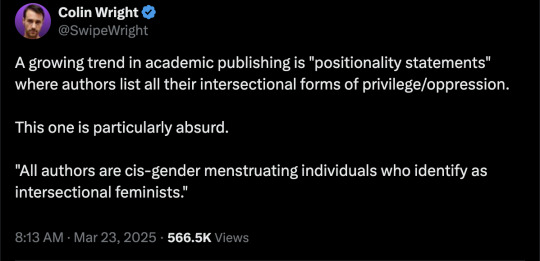

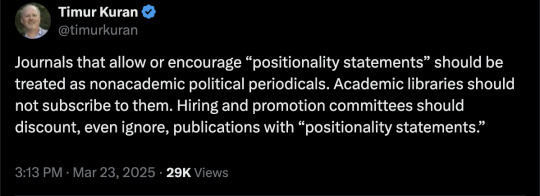
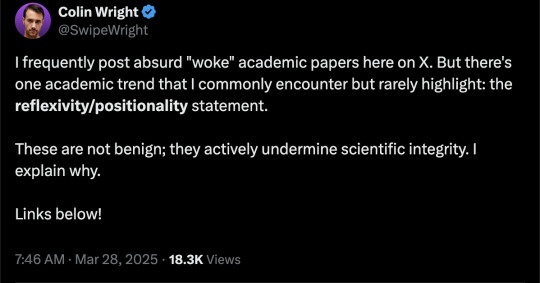
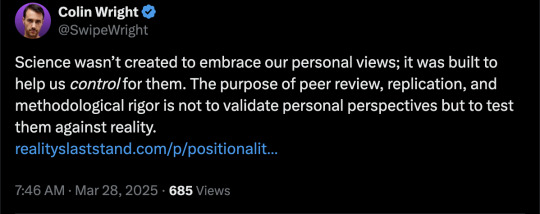
By: Colin Wright
Published: Mar 28, 2025
Some readers may know that I often post ridiculous, ideology-driven academic papers and dissertations on X (formerly Twitter). It’s become a bit of a hobby—calling out how certain fields have drifted into performative activism disguised as serious scholarship. Some of the worst examples turn into full-blown posts here on Reality’s Last Stand, where I break down not just what’s wrong with them, but why everyone should care. However, there’s one academic trend that I repeatedly encounter but rarely highlight, perhaps because it’s become so common it fades into the background: the “reflexivity” or “positionality” statement.
I recently posted an especially absurd example on X, where the authors felt the need to let readers and potential reviewers know that they were all “cis-gender menstruating individuals who identify as intersectional feminists,” among other things.
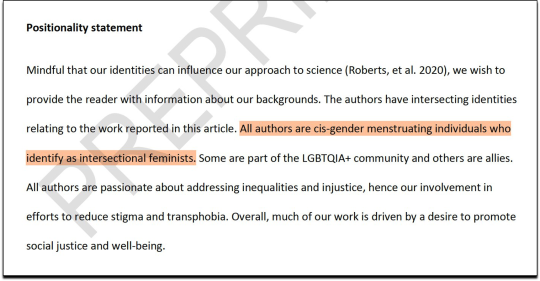
Although these statements are most commonly found in the usual “woke” or “grievance studies” disciplines—fields that openly reject traditional scientific norms and standards—they are now creeping into mainstream, even top-tier, science journals. What started as a practice mostly limited to qualitative research in the social sciences has now spread much more widely. Take this example from a paper published in Nature Ecology & Evolution:
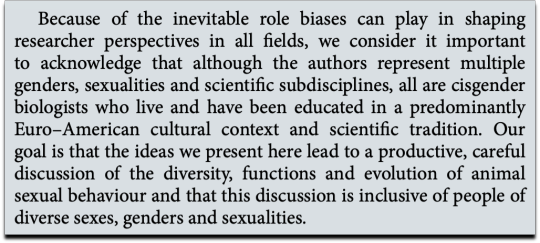
We should all certainly hope that the authors have been “educated in a predominantly Euro–American cultural context and scientific tradition,” given that the paper is published in a Europe-based science journal!
So what’s going on here? What exactly is a positionality statement, and why are researchers including them?
In short, a positionality (or reflexivity) statement is a formal acknowledgment by researchers of their own social identities—such as race, gender, class, sexuality, or other “lived experiences”—that may have shaped their perspective on the research topic. Think of it like a conflict-of-interest (COI) disclosure, except instead of revealing financial ties that might compromise a researcher’s objectivity, the author is confessing their social location and ideological commitments.
Supporters of this practice claim it promotes transparency. They say it’s just being honest: all people have biases, so why not acknowledge them up front? But the reasoning gets much more ideological than that. Their view isn’t just that people are shaped by their environment—which is obviously true—but that all knowledge is socially situated. This belief comes from a branch of feminist and postmodern philosophy known as “standpoint epistemology.” According to this view, people from marginalized groups enjoy a kind of “epistemic privilege”: because of their lived experiences, they are thought to have special access to certain truths, especially about oppression and injustice. However, this epistemic privilege has been extended to scientific truths as well. The fatal flaws in this philosophy will be made clear later on.
On the surface, positionality statements seem noble—who could be against reflection and transparency? But when you start looking at it more closely, many serious issues begin to surface.
The most thorough critique of positionality statements I’ve seen comes from a paper titled “Positionality and Its Problems: Questioning the Value of Reflexivity Statements in Research” by Jukka Savolainen, Patrick J. Casey, Justin P. McBrayer, and Patricia Nayna Schwerdtle, published in Perspectives on Psychological Science. In it, the authors lay out three major objections to the practice, each of which should give serious pause to anyone who believes science should be guided by evidence and logic instead of ideology.
Positionality Statements Are Fundamentally Flawed
The first objection is philosophical: positionality statements are inherently self-defeating. They attempt to disclose how a researcher’s identity may shape their perspective on a topic, but the very epistemology that justifies positionality statements—standpoint theory—also undermines the credibility of any such self-disclosure.
As Savolainen et al. point out, reflexivity statements are “constrained by the very positionality they seek to express.” The idea here is almost paradoxical: if your identity shapes and distorts your view of the world—including your ability to reflect on yourself—then your positionality statement is just as distorted as your research. “Like a scale that tries to weigh itself,” they write, “constructing a credible positionality statement is ultimately an impossible task.” If you genuinely believe that your social location biases everything you do, then the positionality statement you construct to describe that bias is already infected by the same problem.
Advocates of positionality statements might respond: Sure, nobody is perfectly objective, but researchers can still identify some facts about themselves—like race, sex, class, or gender identity—that provide readers with useful context. The authors acknowledge this objection. Yes, it is “quite easy for scholars to accurately report their biological sex, their gender identity, nationality, race/ethnicity, and many other personal characteristics.” These are, to some extent, knowable and reportable.
But as the authors rightfully highlight, those things are often the least relevant to the scientific content of a study: “We take issue with the assumption that these kinds of attributes—the listing of which dominates positionality statements—are particularly salient for any given study.” Just because a researcher is white or black, rich or poor, or “cis” or “trans,” doesn’t automatically mean those characteristics shaped the research process or interpretation in any meaningful way. And if they did, simply reporting them does not magically make that bias evaporate.
To drive the point home, the authors analyze a published positionality statement (below) by Elliott and Reid (2019), where two white women reflect on the “dangers” of writing about low-income black Americans.
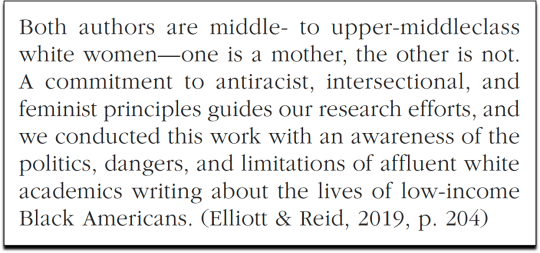
The authors of this statement claim to be guided by “anti-racist, intersectional, and feminist principles” as a way of signaling their political virtue and awareness. But as Savolainen and his colleagues point out, why focus only on those traits? Why not mention other potentially relevant parts of their identity, like their religion, education, or personality? As the authors ask, “Why did the authors reflect on the ‘dangers’ of racial and class dynamics but seemed unbothered by their strongly expressed political commitments?”
Their point is that these statements often highlight only the identity traits that are currently popular or politically favored, while ignoring others that might matter just as much. This selective framing undermines the supposedly honest and reflective nature of the exercise, turning it into a performance, perhaps often crafted to align with disciplinary norms or to curry favor with reviewers and editors.
This leads to a tough but fair question: “Should the research community trust the authors themselves to decide which aspects of their lives need to be disclosed to people who read their research contributions? We think the answer is ‘no.’”
And this isn’t just a problem with one paper—it’s a problem with the entire practice. Positionality statements claim to reduce bias, but in reality they often just amplify the author’s subjectivity under the illusion of self-awareness.
The authors sum it up:
Our point is to illustrate the challenges involved in crafting a positionality statement of any kind. These kinds of statements are unpersuasive because academic scholars cannot have it both ways. They cannot, on the one hand, claim to be burdened by their biography when conducting the research, yet, on the other hand, be emancipated from it while constructing a positionality statement. Fortunately, as we demonstrate next, this inescapable dilemma is not something that needs to be solved.
Positionality Statements Misdiagnose the Source of Scientific Bias
The second problem is that positionality statements focus on the wrong kind of bias. Bias in science does not primarily originate from individual characteristics—your race, gender, politics, or upbringing—but from a failure of the process by which knowledge is created, tested, and refined. Scientific bias is not reduced or eliminated by announcing your identity; it is reduced by rigorous methodology, peer review, replication, and being open to criticism.
As Savolainen and colleagues put it, “Positionality statements are beside the point: By focusing on the characteristics of participating scholars, these kinds of declarations miss the true sources of research bias—the field’s collective failure to adhere to the scientific ethos.” Science doesn’t work because scientists are unbiased—they aren’t. It works because the system is designed to push everyone’s ideas through a rigorous, competitive process that filters out error over time.
Ironically, by putting the spotlight on personal identity instead of scientific methods, positionality statements may actually increase bias. Instead of focusing on methods, data quality, and replicability, we are asked to judge research in part based on the author’s race, gender, or ideological alignment. That’s not objectivity—it’s just replacing one kind of bias with another.
Positionality Statements Undermine the Norms That Protect Science
Finally, and perhaps most dangerously, positionality statements erode the very norms that make science trustworthy in the first place—especially the principle of universalism. This is the idea that scientific claims should be judged by the strength of the evidence, not by who is making the claim. What matters is the quality of your data and reasoning, not your identity.
But when journals start asking (or requiring) researchers to include positionality statements, they flip that principle on its head. Instead of suppressing identity cues through double-blind peer review, we now ask authors to foreground them. That opens the door to identity-based favoritism, virtue signaling, and even manipulation. Authors may exaggerate or fabricate aspects of their biography if they believe it will help them get published. And let’s be honest: positionality statements are only encouraged in one direction. Progressive researchers are encouraged to share their “marginalized” identities or activist goals. No one is asking conservative, religious, or apolitical scholars to declare their “lived experiences” or ideological frameworks—unless to apologize for them.
As Savolainen and co-authors put it, positionality statements have become “a way for authors to signal their adherence to the ideological mainstream of a discipline.” It’s less about being transparent and more about proving you’re on the “right side.” Often, these statements read like a shield: “We are good and right-thinking researchers—please don’t peer-review us too hard.”
This gets to a deeper and more cynical interpretation of the trend. As I’ve often pointed out, there’s a growing body of academic work that looks more like propaganda in the language of scholarship. Positionality statements are part of that performance. Yes, it's true that personal identity and politics can influence research. But the idea that simply declaring your bias somehow cancels it out is ridiculous. In practice, it often does the opposite—it gives researchers permission to lean even harder into their bias while pretending to have neutralized it.
We all have biases—that's just part of being human. But science wasn’t created to embrace our personal views; it was built to help us control for them. The purpose of peer review, replication, and methodological rigor is not to validate personal perspectives but to test them against reality.
If we want a more inclusive, robust, and representative science, we should be pushing for better methods, open data, and viewpoint diversity—not more identity-based posturing. As Savolainen and colleagues argue, “the most productive path to increasing representation and reducing positional bias in research is to protect the freedom of scholarly inputs while insisting on methodological transparency and rigor.”
Science doesn’t need more confessionals. It needs more rigor.
==
This is the endorsement of the Genetic Fallacy as a moral imperative.


Xians tell me that I'm disqualified from criticizing Xianity because I'm not a Xian. Muslims tell me that what I have to say about the quran is irrelevant.
Except, neither of those things are true.
If you're giving "positionality statements," you're not doing science.
#Colin Wright#genetic fallacy#intersectionality#positionality#positionality statement#science#academic corruption#propaganda#bias#scientific bias#religion is a mental illness
10 notes
·
View notes
Text
in general i think positionality statements do more good than harm but god does it suck writing one. i guess thats part of the point.
#i feel somewhat of an obligation to mention my agab in this because of what im writing about and i do not want to!!#even if its pretty obvious to people in person
2 notes
·
View notes
Note
can't reblog the post.. for reasons, but in a lot of academic publishing these days there are "positionality statements" where authors list all their intersectional forms of privilege/oppression. https://en.wikipedia.org/wiki/Positionality_statement
oooo thanks for the context. I mostly have experience with math and informatics articles, so I didn't know that about social sciences.
Still I think authors from that post could word their description better.
2 notes
·
View notes
Text
The amount of third positionism around today is off the charts. People act like we live in a world that will respond positively to their ~nuanced~ statements and frameworks.
2 notes
·
View notes
Text
Spent all day writing my paper and appendix. Bulk of it is done at least. Only need two more pages, which are just a description of a chart, my positionality statement, and conclusion. I’ll do them tomorrow because my brain is fried at this point. I’ll just type up my interview notes and organize my APA reference page tonight since that doesn’t require much focus.
Almost there. Almost done with this damn class. Submit by midnight tomorrow and then I am done. For 8 weeks since I only have one class for the fall semester 🙌 Oof I am so burnt out from this summer with all the drama in every aspect of my life….
4 notes
·
View notes
Text
Positionality Statements
An acknowledgment of the blog author's backgrounds and biases.
I am Grace LaFrancois. I am a 19-year-old cisgender woman attending the college of William and Mary. I was raised in an upper-middle-class white household in Sterling, VA. I attended public school in Loudoun County, VA. I have been interested in feminism from a young age and was provided some education on feminist movements in school throughout middle and high school. I first read about Argentinian feminism in a course about Latin American feminism this semester, and it really stuck with me after I heard about the mothers of the Plaza de Mayo, and I became interested in the different movements within the region.
I am Will Elliott, a 23-year-old, white, non-binary person attending William & Mary. I was raised in a middle-class household in North Carolina. Due to a neglectful home, I did not attend K-12 education, but I completed a G.E.D. in 2020, attended community college in Ohio 2021-3, and transferred to W&M in 2024. As a non-binary person, feminism has been an important part of most of my life, even before I really knew what it was. I had been following some Argentinian politics before taking it, but my interest in feminist politics in Argentina started in the same Latin American feminism course as Grace.
2 notes
·
View notes